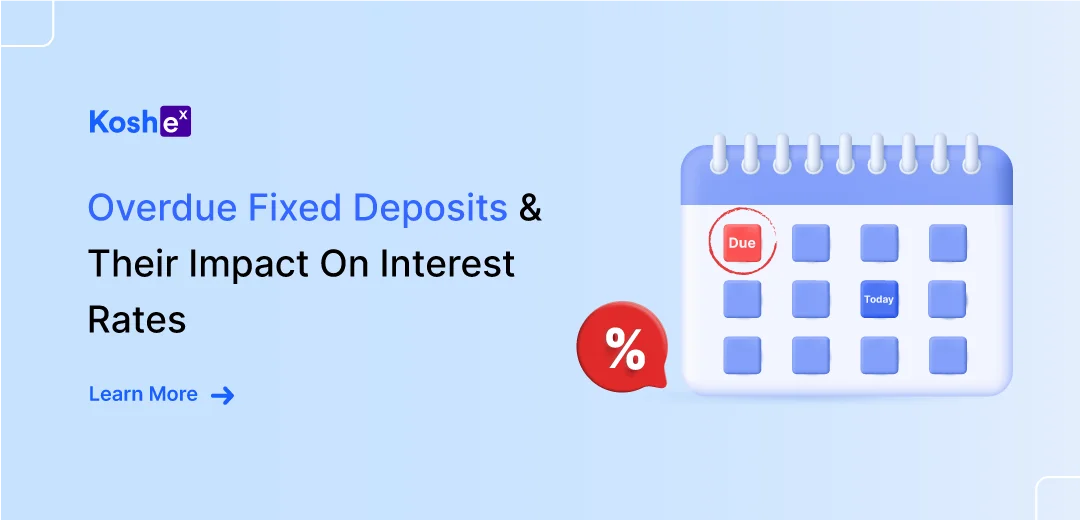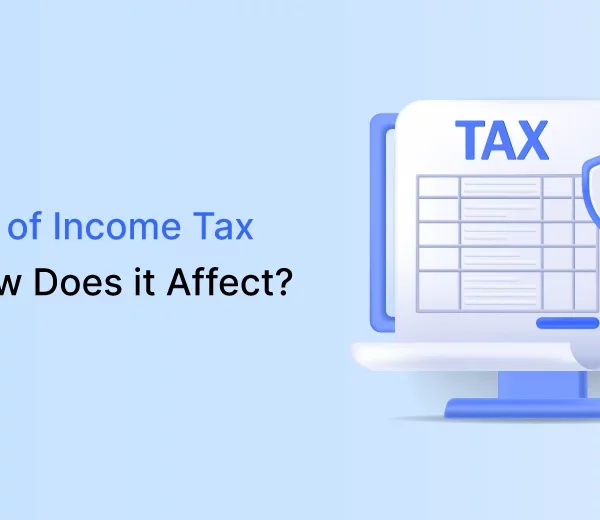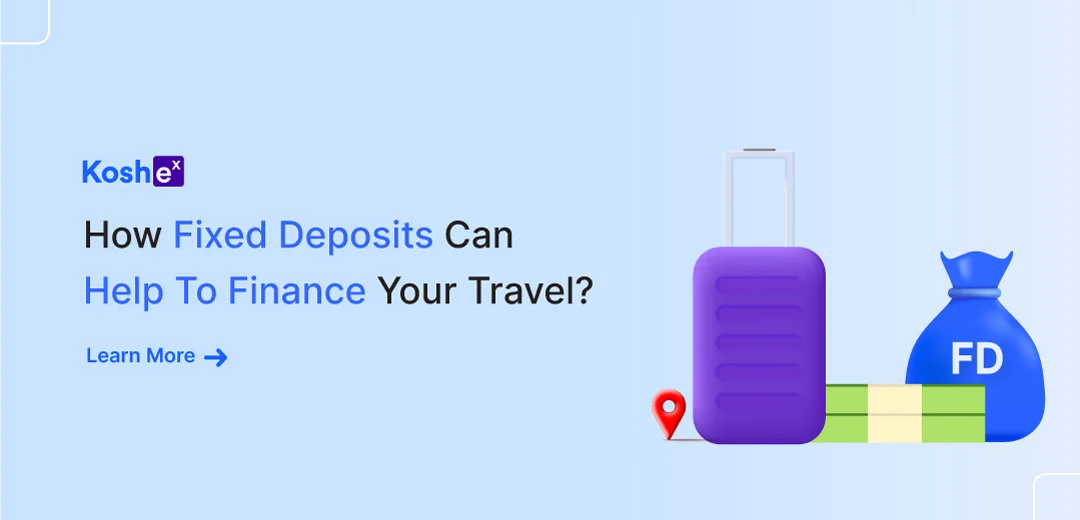Fixed deposits are one of the safest investment options and again gained popularity after the recent interest rate hikes.
After the recent hike of 35 basis points (the 5th time indeed), the overall repo rate increased by 2.25% in just 8-9 months.
This will result in less borrowing and spending and more savings. The rising interest rate also increased the interest rates on fixed deposits.
In some cases, the investors make a fixed deposit, but it becomes an overdue fixed deposit leading to a loss of interest. The RBI came up with a notification, but the loss is still apparent. How? Let’s find out with Koshex!
What is Overdue Fixed Deposit?
When the fixed deposit tenure ends, the depositor shall either collect the maturity proceeds or renew the fixed deposit. But, if the depositor fails to appear and take either action, the fixed deposit becomes overdue. The funds remain idle (dormant) and unclaimed with the bank until the depositor appears to take action.
Do Overdue Fixed Deposits Earn Interest?
The fixed depositor deposits the funds for a pre-determined term. Only for this tenure can the depositor earn the interest on fixed deposits. Once the term expires, the bank can no longer pay interest to the depositor. However, certain banks did pay interest equivalent to the savings deposits.
However, the Reserve Bank of India amended Section 9(b) of the Master Direction – Reserve Bank of India (Interest Rate on Deposits) Directions, 2016. This changed the way banks deal with the interest on overdue fixed deposits.
As per the amendment, the banks are required to pay interest on overdue fixed deposits at a lower of the following rate:
- Rate of interest as applicable to the savings bank account
- Contracted rate of interest on the matured TD (term deposit)
The interest shall accrue till the time proceeds are unpaid. This rule shall apply to the fixed deposits held with all kinds of banks, such as Scheduled Commercial Banks, Small Finance Banks, Local Area Banks, and Co-operative Banks.
Is it Good for Us?
While it is a pro-investor measure by the RBI, it still doesn’t help much regarding interest earnings. The savings bank interest is less than half of the fixed deposits offered. We can easily earn a 5.5%-7% per annum interest on the maturity of fixed deposits. In the case of senior citizens, the interest is even higher.
However, the interest rate on the savings bank account is only 2.5%-3% per annum. Thus, if the fixed deposit becomes overdue, the interest earned by the depositor will still be significantly lesser than that provided by the fixed deposit.
What Should We Do?
If our fixed deposit becomes overdue, we are at least assured interest equivalent to that provided by a savings bank account. However, it is still better to visit the bank and either collect our funds or renew our fixed deposit.
Even though we get 2.5%-3% interest, it is significantly lower not only compared to fixed deposits but also to the current inflation rate. Let’s understand the consequences in detail and plan further action.
Suppose you have invested Rs. 10 lakhs in a fixed deposit for one year. Here, the TD matures, and proceeds should be collected after one year, or the TD should be renewed.
The contracted rate of interest rate was 6% per annum. Therefore, in the first year, I earned an interest of Rs. 60,000.
However, after the year ended, I forgot to either renew my fixed deposit or take back my money, which remained unclaimed with the bank. Let’s check out the situation before and after the RBI’s amendment.
- Before Amendment: In this case, the bank could have denied any interest on my fixed deposit funds lying idle with them. This would directly lead to a loss of Rs. 60,000 per annum.
- After Amendment: In this case, the bank shall be liable to pay the contracted interest rate or the interest rate on the savings account, whichever is lower. As the ongoing interest rate on the savings bank account is 2.5% per annum, the bank would have paid only Rs. 25,000 each year until I renewed my deposits or took back my fund. Even though I earned Rs. 25,000, I am still at a loss of Rs. 35,000 yearly.
We should keep track of the maturity date when our deposits will mature and either collect our funds or renew our deposits. Let’s explore both these options in detail.
Renewing our Fixed Deposit Funds
We could simply renew our fixed deposits. We can also direct the bank to auto-renew our fixed deposit when initially making the deposit.
This is ideal if we wish to invest for the long term, as this will ensure that we don’t have to keep track of the maturity date.
In the auto-renewal of fixed deposits, the bank will renew the deposit for the same term but with the prevailing interest rate.
Thus, if the interest rates had increased, auto-renewal would be advantageous. Similarly, if the interest rates had fallen, it would be disadvantageous.
In other cases, we would have to visit the bank to renew our fixed deposit physically. Renewing the fixed deposit is an ideal choice if we don’t need the funds, there is an increase in the interest rate, or we don’t have a high-risk appetite.
Withdrawing our Fixed Deposit Funds
Another option is to withdraw our fixed deposit funds. We will need to visit the bank to withdraw our fixed deposit funds.
We can either utilize these funds for our use or invest in other investment avenues like mutual funds or digital gold.
We should consider our risk appetite and current macroeconomic factors while withdrawing funds. While avenues like mutual funds are market-linked and riskier compared to fixed deposits, they also offer higher returns than fixed deposits.
In a Nutshell
While the RBI’s amendment is pro-investors as it allows investors to earn at least basic interest on overdue fixed deposits, the investors are still at a loss considering the current interest rates of the savings bank account.
Thus, we must keep track of all our fixed deposits and renew or withdraw at maturity. We can restore or invest in other profitable avenues if we consider reinvesting.
Koshex is an investment platform that allows investors to invest in fixed deposits, smart deposits, mutual funds, and digital gold.
Interestingly, it also allows investors to automate their investments. It offers multiple diversification options to investors, thus helping them reduce risk while achieving their financial goals.
When are you starting your investments? Sign up with Koshex to help you make the best of all investments.
Frequently Asked Questions
Has the recent interest rate increase also increased fixed deposit rates?
Yes. After the RBI hiked repo rates, the interest rates for loans and fixed deposits increased. This made fixed deposits a lucrative option for investors.
How to decide whether to invest in a fixed deposit or mutual funds?
It all depends upon your risk appetite and investment goals. Further, why select between them when you can choose both of them? Koshex allows you to invest in mutual funds and fixed deposits from its platform.









Leave a Comment